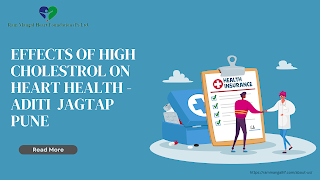Effects of High cholestrol on Heart Health - Aditi Jagtap Pune
High cholesterol levels have long been recognized as a significant risk factor for heart disease. Cholesterol is a waxy substance produced by the liver and found in certain foods, such as meat and dairy products. While the body needs cholesterol to function correctly, excess amounts can lead to the formation of plaque in the arteries, which can increase the risk of heart disease.
Two different lipoproteins, low-density lipoprotein (LDL) and high-density lipoprotein (HDL), transport cholesterol through the bloodstream.. LDL, also known as "bad" cholesterol, can build up in the arteries and form plaque, leading to atherosclerosis, which can ultimately lead to heart attack or stroke. HDL, on the other hand, is known as "good" cholesterol because it helps to remove excess cholesterol from the bloodstream and transport it to the liver for elimination.
When the levels of LDL cholesterol in the blood are too high, the excess cholesterol can accumulate on the walls of the arteries, leading to the formation of plaques. As these plaques grow, they can narrow the arteries and reduce blood flow to the heart. This can cause chest pain or discomfort, known as angina, and can also increase the risk of heart attack and stroke.
High cholesterol levels can also lead to other heart-related conditions, such as peripheral arterial disease (PAD) and coronary artery disease (CAD). PAD is a condition where there is a buildup of plaque in the arteries of the legs, leading to pain and cramping in the legs while walking. Aditi Jagtap Pune said that CAD is a condition where there is a buildup of plaque in the coronary arteries, which supply blood to the heart muscle, leading to chest pain, shortness of breath, and heart attack.
While some people may have high cholesterol levels due to genetics or other factors outside of their control, many lifestyle changes can help lower cholesterol levels and reduce the risk of heart disease. Dr. Ranjit Jagtap News stated below listed ways to overcome such conditions :-
Maintain a healthy diet: A healthy diet that is low in saturated and trans fats and high in fruits, vegetables, whole grains, and lean protein can help to lower your cholesterol levels and protect your heart.
Get regular exercise: Regular physical activity, such as walking, jogging, swimming, or cycling, can help to lower your cholesterol levels and reduce your risk of heart disease.
Quit smoking: Stop smoking since it can boost your cholesterol and put you at risk for heart disease. Quitting smoking is one of the healthiest things you can do for your heart.
Manage your weight: Being overweight or obese can increase your cholesterol levels and increase your risk of heart disease. Maintaining a healthy weight through diet and exercise can help to lower your cholesterol levels and protect your heart.
Monitor your cholesterol levels: It is important to have your cholesterol levels checked regularly, especially if you have a family history of heart disease or high cholesterol. Your healthcare provider can help you determine your target cholesterol levels and develop a plan to manage your cholesterol levels if they are high.
Take medications as prescribed: If you have high cholesterol levels, your healthcare provider may prescribe medications such as statins to help lower your cholesterol and protect your heart. It is important to take these medications as prescribed and to talk to your healthcare provider if you have any concerns or questions.
In conclusion, high cholesterol levels can have a significant impact on heart health and increase the risk of heart disease, says Dr. Ranjit Jagtap Daughter. By making lifestyle changes such as eating a healthy diet, exercising regularly, maintaining a healthy weight, quitting smoking, and limiting alcohol consumption, individuals can lower their cholesterol levels and reduce the risk of heart disease. It is essential to talk to a healthcare provider about cholesterol levels and risk factors for heart disease and develop a plan to manage them effectively.




Comments
Post a Comment